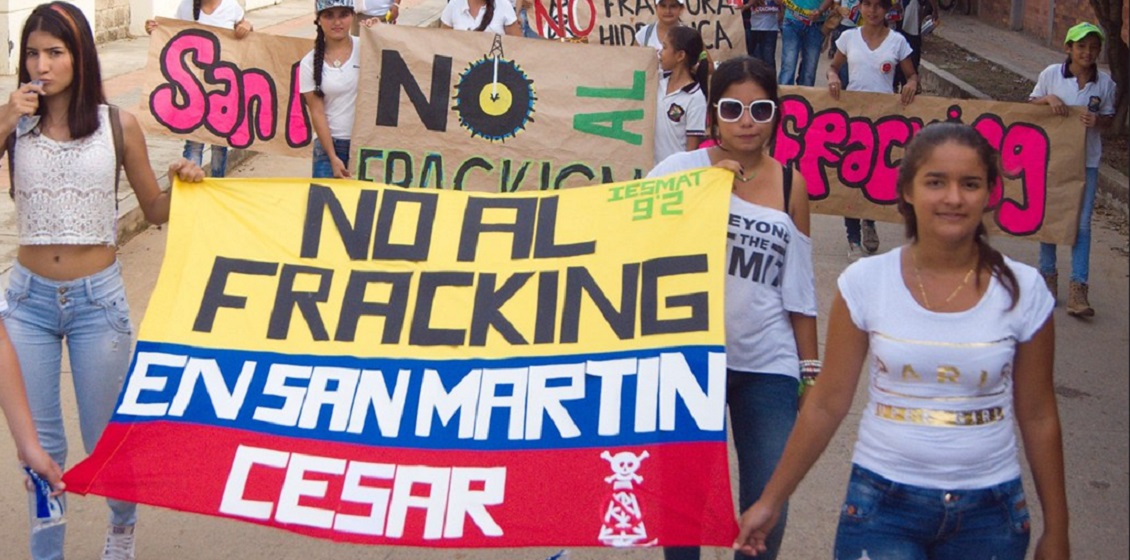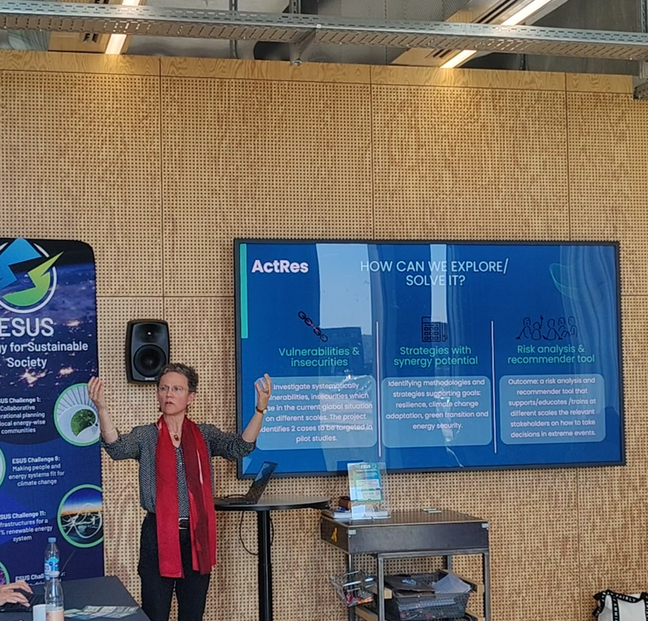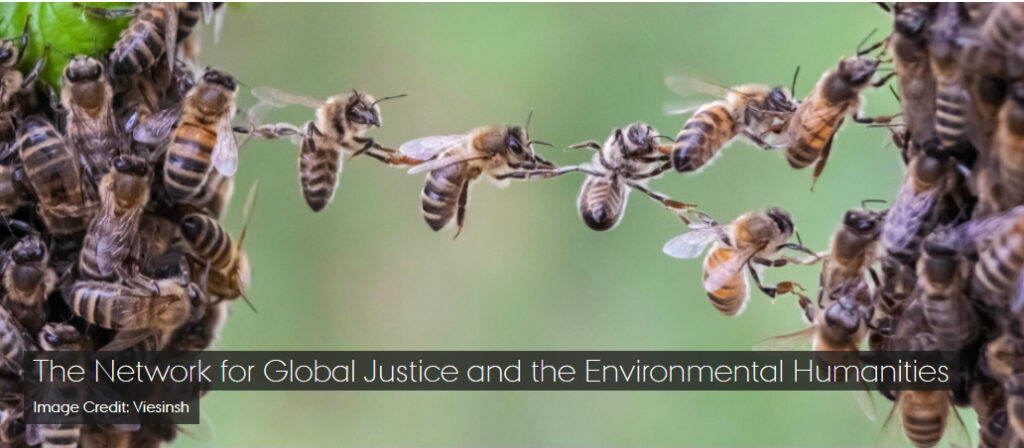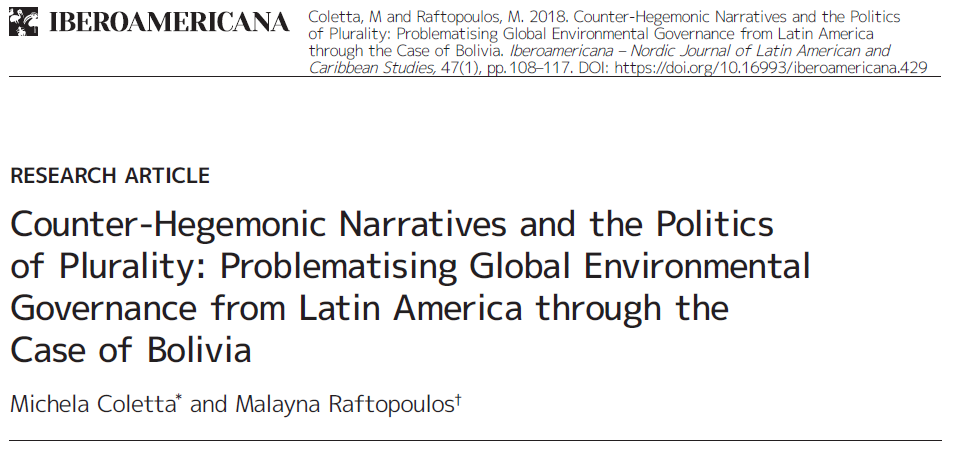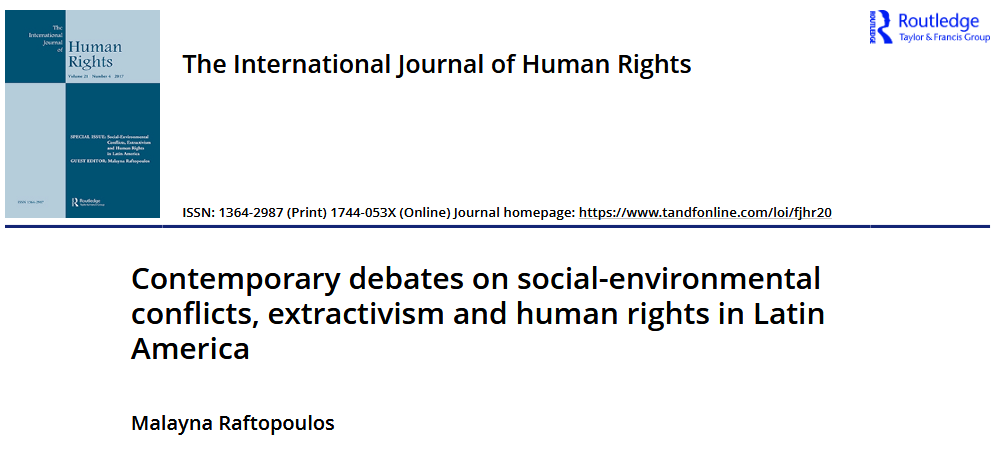A British researcher in Aalborg is working with anti-fracking movements and environmental issues in Latin America. According to her, Latin America adds something extra to the debate about our societies’ perspectives on nature. She regrets that Latin American studies are now pushed into the margin of research.
It is “really important that academics publish in accessible means and participate in publication projects that might not necessarily gain them academic points, in order for their research to reach beyond the academic community”, says Malayna Raftopoulos.
She comes from Wales and is now Associate Professor at the Department of Politics and Society at Aalborg University in Denmark. Her current research focuses on anti-fracking movements in Argentina and Colombia, especially the human rights and environmental consequences of extraction projects on local communities.
“My research is particularly useful in communities in Latin America where you are living with mining, oil and gas activities, and extractivism at your doorstep, and do not normally speak English. Therefore, publishing in Spanish is very important for it to be used by civil society groups in the region when discussing the impact of extractivist activities in their territories.”
However, the BFI-point-system to measure employee performance at Danish universities has made it “more difficult for academics to prioritize writing in lesser known Global South journals or books.” Now the BFI-system has been canceled in Denmark as part of a political agreement, but the performance of academic employees is still measured in another way, and the system has hardly become less anglophone.
As a student, Malayna Raftopoulos studied Spanish and Development Studies at Liverpool University and finalized a master thesis and her PhD in Latin American Studies at the same university. Later, she focused her research efforts on environmental politics, environmental governance, climate change policies, disaster risk management and natural resource development, particularly oil and gas. In recent years, she has studied anti-fracking movements in Latin America and increasingly also in countries in the Global North like the United Kingdom, Germany and Spain.
“My research career has focused on sustainability from the beginning. When I started my PhD about sustainable tourism in small rural communities in the ’eyebrow’ of the Amazon region in Peru in September 2009, it was a relatively new emerging area, a new field of expertise. Now, sustainability has become a massive buzzword – in academia but also in the public and private sectors, all throughout society.”
Shortage of interest in Latin America
Malayna Raftopoulos observes that ”there is a real shortage of interest and literature about Latin America in Denmark. There are very few Latin American programs at Danish Universities, and unfortunately the one in Aalborg will soon close. Another option to learn about Latin America is being closed.”
“This is not particular to Denmark,” she underlines. ”Exactly the same is happening in other European countries like the U.K. A few decades ago, many people engaged in the fight against poverty and inequality in the region. There are still parts of Latin America, like Central America, which are extremely poor and have huge political, economic and social problems. But now several Latin American countries are emerging as middle-income countries. Under President Lula, Brazil had massive economic growth. People become less interested in a continent that is doing well by itself. Nowadays, when you think about the Global South, you mostly think about Africa.”
“At the same time, we can observe a general decline in academic and media interest in the Global South. If you combine these trends, Latin America is increasingly pushed to the margin of research in Europe. I think that is extremely sad.”
Malayna Raftopoulos has spent a lot of time in Latin America the last fifteen years. She has been ”on the ground” a lot, she has witnessed how diverse and interesting the continent is, and she has of course gotten a lot of local contacts. Not only an Associate Research Fellow at the Centro Latino Americano Ecología Social, Uruguay, as well as at different academic institutes in the UK – she also collaborates with NGOs, representatives of civil society groups, and quite a number of local people. “I have networks with all of them. It’s a real mix between civil society and academics.”
“I just write to people, I contact them directly, I explain my project and my research. People in Latin America are normally very willing to talk to you. I have interviewed so many people in civil society groups and also in government institutions, as well as local citizens. Many of them have become my friends.”
“I definitely develop my own ideas at my office in Aalborg, but when you start talking to people, especially on the ground, these ideas evolve. The next direction you take is influenced a lot by your discussions with other people. When you come as a Global North researcher, how can you possibly deduce the reality of the situation? You can observe and see it, you can experience a little bit of it, and you can talk to people. But of course you cannot write about something that happens in the Global South without involving relevant people from the Global South. It’s impossible to do this work without having South colleagues as partners.”
“We are exchanging empirical as well as theoretical knowledge. That is what academia is about – it’s knowledge exchange. Even though we are based in the Global North, we can still make important contributions by considering the broader perspective and linking one case to the other, while drawing on insights from the local perspective and collaborating with scholars from the Global South.”
Viewing nature as a subject with its own rights
One challenge researchers in the South and North have in common is how to find funding for your research.
“The fracking issue is highly political, isn’t it? Energy security is on top of the political agenda, and most governments are still pushing forward with fracking. I am working together with a colleague from the University of London, and when I was still working there myself, we had angry pro-fracking people running through the corridors.”
“However, it is important to understand the impact of energy policies like fracking both to help governments and industries better understand the social and political dynamics of fracking, but also to address the concerns and grievances expressed by communities and civil society organizations.”
“It’s interesting to make comparisons between how anti-fracking movements work in the Global South compared to the Global North. There are so many transnational connections – this issue is able to transcend national boundaries. Most environmental issues are. by nature, global issues, not contained by boundaries.”
Malayna Raftopoulos is participating in a network with other Danish-based researchers with the purpose of strengthening collaboration between scholars and civil society within the field of global environmental justice in both the Global North and the Global South. This network collaboration between Aarhus University, Aalborg University and Roskilde University has received a networking grant from Denmark’s humanities’ research council.
Apart from that, she is using the time allotted for research in her job as Associate Professor. “It’s very difficult to get additional funding”, she says. When it is related solely to Latin America, it is ‘virtually impossible’.”
Malayna Raftopoulos has worked with sustainability as a goal for her research long before anybody sat down to formulate the UN Sustainable Development Goals (the SDGs). “Sustainability has become defined by the SDGs. We are using them in our teaching, and it’s positive as well as negative. It has become very difficult for sustainability to be envisaged outside the SDG goals.”
“But in terms of knowledge processes, Latin America has – with all its diversity – something important to add to the way we are seeing and understanding nature and the environment, in terms of ontological and epistemological perspectives. Something which is not easy to include in the standard reading of the SDGs.”
In countries like Bolivia and Ecuador, the current constitution gives nature its own legal rights and bridges the division between nature and society. They shall be protected. In spite of that, both countries have ”massive extractivist” policies. But still, in the eyes of Malayna Raftopoulos, ”Latin America adds something extra to the debate about our societies’ different perspectives on nature.” “We in the world, North and South, still view nature as an object. We don’t see it as a subject, as some people do in Latin America.”
“That explains, partly, the richness of research that is coming out of Latin America – and this was part of the reason that my research interest originally developed in the direction of natural resource development and environmental politics in the region. I am fascinated with its immense diversity, not just biodiversity, but also in terms of different communities with totally different approaches to the nature and environment around them.”


